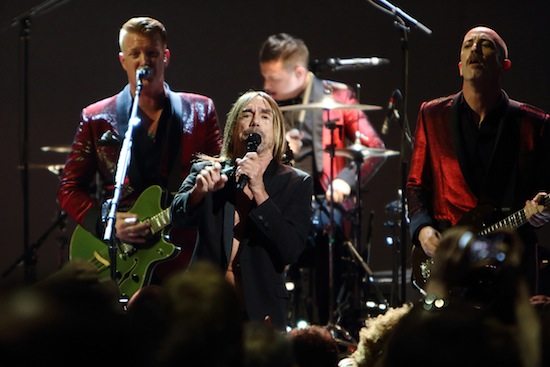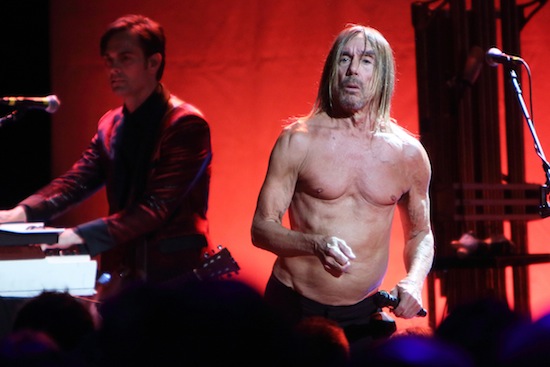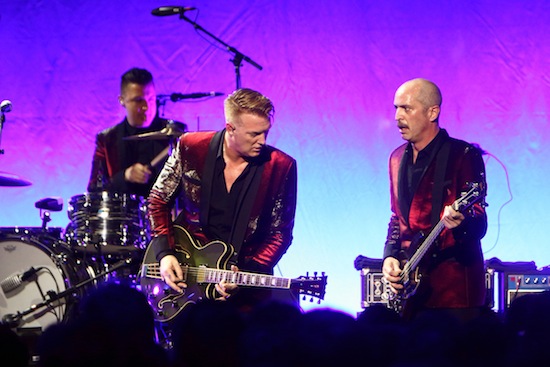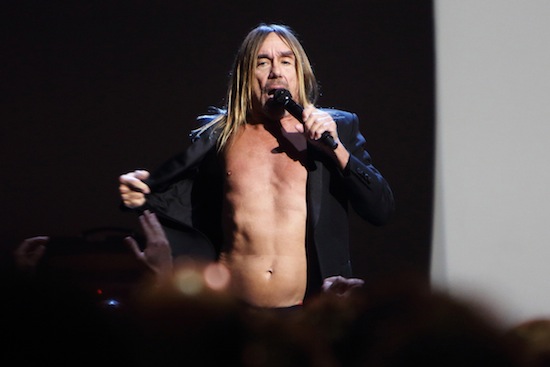The recent passing of two thirds of alternative rock’s Holy Trinity of Lou Reed, David Bowie and Iggy Pop has not only left a yawning cultural chasm but also put pressure on the shoulders of the last man standing. Of course it can be argued that all three had left their best work far behind them and it’s certainly undeniable that they dropped some monumental stinkers since those glory days. But what work that was; these were contributions so huge that they altered the course of music history
Iggy Pop is certainly a case in point. It’s been over 20 years since he released American Caesar, his last record of substance. Since then, it’s been difficult to shake the feeling that he’s been chasing an audience thanks to any number of pointless collaborations with the worst of his descendents while cruising on auto pilot when it came to his recorded output. His live gigs, however, have always been cathartic experiences; few are the artists prepared to invest that much energy, physicality and the high risk of personal damage into their performances while breaking down the barriers between them and their audience. Relentlessly energetic affairs, the fact is that Iggy has maintained his explosive performances beyond middle age and into the autumn of his years.
But what has been evident is that it’s the people that he’s worked with that have brought out either the best or the worst in him, and sometimes both at the same time. Despite working with some fine musicians over the years – Steve Jones, Andy McKoy, Whitey Kirst – none have ever managed to capture what was created during Iggy’s peak years with first The Stooges and then in Berlin with David Bowie and the Sales brothers. So while someone like Whitey Kirst played hard and fast, he could never quite match the sonic brutalism of James Williamson or the lightness of Ricky Gardiner. Little wonder, then, that he found himself re-united with Ron and Scott Asheton to re-activate The Stooges, and then later with Williamson in the wake of Ron’s untimely passing. But even so, the two post-Raw Power albums released under The Stooges’ name – The Weirdness and Ready To Die – proved to be highly underwhelming affairs.

So what’s a boy to do? Pop is nothing if not canny and perhaps mindful of his mortality and the need to leave behind a document that stands proud with the best of his material, turning to Queens Of The Stone Age’s Josh Homme has proved to be a shrewd move. Released in March of this year, Post Pop Depression is easily the best album Iggy Pop has put his name to since Lust For Life. Anyone expecting a stoner rock album has been left sorely disappointed but for everyone else there is a densely layered work that lifts Pop out of his default setting while being acutely aware of the Berlin period and exactly what made that music so unique, so special and so durable. So while Post Pop Depression makes no effort to sound like those two albums made with Bowie, it does match the mood and feel of exploration while finding new areas to mine. What’s more, this is Iggy’s most introspective album as he pauses to consider his mortality and legacy over music that refuses to take the path of least resistance.
You’d be forgiven for thinking that all of this would lead to a bittersweet experience in the prestigious environs of the Royal Albert Hall. Fuck that. From the moment the curtain is raised, Pop is an explosive and whirling dervish, a ball of tightly wound energy and raw fucking power that belies his 69 years. It would be comical if it wasn’t so convincing and the reason that it’s so believable is that he’s digging deep into himself and exposing his very soul and reason for being. The effect is infectious and within seconds the Royal Albert Hall is on its feet. Chaos reigns supreme as those lucky souls in front of the stage abandon their seats and all pretence of decorum to pile on down to the front.
Behind him are the figures of guitarists Josh Homme, Dean Fertita and Troy Van Leeuwen, bassist Matt Sweeney and Arctic Monkeys’ Matt Helders on drums. Suited and booted in matching red jackets and black trousers, they’re easily the most homo-erotic collection of testosterone since The Bad Seeds and right here, right now, ‘Lust For Life’ is sounding colossal. Unlike Pop’s many previous bands, this isn’t a bludgeoning of the material but a sensitive yet powerful recreation of what was birthed almost 40 years ago. But it’s when the band strike up ‘Sister Midnight’ from The Idiot that they really show their teeth and intent. See, because so much of Iggy’s reputation is based on the visceral nature of his performances, it’s been all too easy to forget just how much groundbreaking music he’s actually been involved with. Yet here is Homme and his crew paying attention to the ambition of the original vision, the nuances and flourishes that lifted it out of the mundane and into hallowed and rarified ground and taking it into the 21st century where it still dares lesser artists to catch up with it.

“Fucking thank you for coming!” yells Iggy and for a moment it feels as if the Royal Albert Hall may overwhelm him. “Fuck! Fuck! Fuck! Fuck!” he repeats over and over again but by the end of ‘American Valhalla’ he’s tossed his jacket to one side and the now familiar sight of Iggy’s leathery torso is once again unashamedly on his display. He cuts both an endearing and inspirational figure. With one leg shorter than the other, he moves with simian grace across the stage and his aging muscles and skin no longer possess the tightness of yore. All of this matters not a jot, and rightly so because, as ever, he rejects conformity, tedium and notions of what’s age appropriate and what isn’t in favour of personal freedom and the joy of living and breathing. This isn’t existence; this is life.
But while Pop personifies the physical aspects of his art – he swan dives from the stage at the end of ‘Some Weird Sin’ and is bleeding soon after – Homme and his cohorts apply a cerebral approach to the music. This isn’t too suggest the band takes a back seat – far from it as evidenced by the towering guitarist’s dances and shimmies across the stage with his bandmates – but the level of care that has gone into the music is breathtaking. Witness the three-guitar attack at the end of ‘China Girl’ that sees Homme playing twin lead with Fertita while Van Leeuwen holds down the rhythm. Played with grace and subtlety, it’s a beautiful thing to watch and even more gorgeous to listen to and you can’t help but feel that somewhere The Dame is gazing down approvingly. Elsewhere, ‘Mass Production’ is simply staggering in its scope and delivery, those eldritch loops and spiraling guitars falling into a woozy vortex that’s utterly beguiling. This is the point where myth and reality and ambition and achievement intersect at the point of perfection.
Crucially, for an artist this far down the line, it’s actually a joy to hear new material and for it to bed down so comfortably with those Berlin numbers. With the exception of ‘Vulture’, the whole of Post Pop Depression is given an airing and the sense of pride from its authors is palpable. Iggy frequently gives Homme and the band room to move, each of them grooving as if they’ve arrived at the disco of their dreams. The three-pronged guitar attack, along with those rolling, insistent drums, elevates ‘Sunday’ to a true highlight while ‘American Valhalla’ bumps and grinds with menace and threat.
The level of musicianship is jaw-dropping. As Iggy leaves the stage for a prolonged walkabout in the crowd during a gloriously funky ‘Fall In Love With Me’, the band lock into an extended workout that never feels forced or superfluous that segues effortlessly into a frantic reading of ‘Repo Man’ the moment the singer climbs back on stage.

Yet for all the ramamlama and untrammelled exuberance, the poignancy surrounding the gig is undeniable. If, as stated by Pop elsewhere, this is to be his last hurrah, then he leaves us in a state of triumph. This a performance of naked honesty that serves to remind of a legacy that’s based as much on the groundbreaking music that’s been created in the both the past and the present as much as 50 years of explosive performances and the dark mythology that surrounds him. In a strange way, he’s had to live his career twice for the world to catch up with him. The two Stooges reunions played to audiences far greater than the first time around while his current revisiting of his Berlin collaborations with David Bowie has reclaimed the music from the Transpotting generation while re-establishing his creative credentials as the shadows and long night draws in.
At 69-years-old, Iggy Pop is the last man standing and he’s left the building for a long and well-earned rest. And man, does he deserves it.


